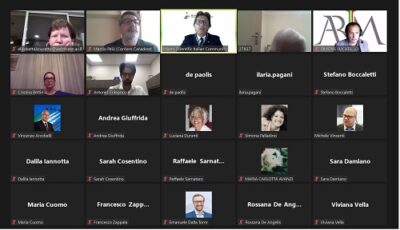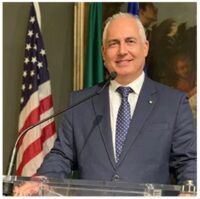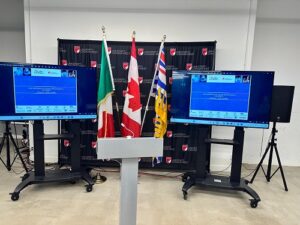Italian researchers from all over the world at the Vancouver conference with TSIC and UCW
VANCOUVER – From Australia to Mexico, passing through Japan to reach Europe: the Italian researchers who participated. yesterday, in the XVIII Conference of Italian Researchers in the World organized by the Texas Scientific Italian Community (TSIC) with University Canada West (UCW) connected from every corner of the world.
Partly present in the East Wing Lounge of Canada West University in Vancouver, partly connected via Zoom, the researchers took turns illustrating projects and research in the most varied fields: science, technology, aerospace, medicine and humanities.
The meeting, moderated by the Italian journalist Marzio Pelù (Corriere Canadese and CNMNG NEWS), opened with greetings sent for the occasion by some of the highest Italian authorities: the President of the Senate, Ignazio La Russa, and Ministers Guido Crosetto (Defense), Orazio Schillaci (Health) and Adolfo Urso (Businesses and Made in Italy). Then, the introductory speeches by Mazi Shirvani (vice president of University Canada West), Michele Vincenti (Chair of Leadership and People Management Faculty – University Canada West), Andrea Giuffrida (president of the Texas Scientific Italian Community) and Costanza Conti, scientific attaché of the Italian Embassy in Canada who read the message from Ambassador Andrea Ferrari.
Then the conference chairman, Vincenzo Arcobelli, representative of the General Council of Italians Abroad (CGIE), spoke. After thanking the UCW, professors Vincenti and Giuffrida, the Scientific Technical Organizing Committee, the presidents of the associations and all the participating researchers, Arcobelli wanted to highlight the appreciation for the institutional messages and the patronage from the Presidencies of the Chamber and of the Senate of the Italian Republic, of the Presidency of the Council, of the Ministry of Foreign Affairs, of the Ministry of Health, of the Italian Embassy in Ottawa, of the Italian Consulate General in Vancouver, of the Istituto Superiore della Sanità and of ENEA .
Arcobelli then informed the audience of the recent death of the general secretary of the General Council of Italians Abroad, Michele Schiavone, who followed the researchers’ demonstration over the years, and of the reasons that brought the event to Vancouver, remembering the late Foreign Affairs official, Consul General Marco Nobili.
“I am enthusiastic – said Arcobelli (in the photo above) – about the participation of numerous representatives of researchers’ associations from all continents. Today more than ever there is a need to network, to collaborate, because I believe that research, science and researchers can contribute to promoting not only innovation, but also peace and security in the world. The associations are a fundamental added value for the Italian System, they contribute through various activities in promoting research, technological innovation and Italian culture. Therefore, they must be supported by institutions to enhance their reach”.
After Arcobelli’s speech, and a video intervention by Rocco Bellantone, president of the Istituto Superiore di Sanità, the researchers’ reports began: the first to speak were professors Giuseppe Ciccarone from Sapienza University of Rome and Stefano Boccaletti from CNR of Florence, followed by General Alessandro De Lorenzo and Colonel Fabrizio De Paolis of the Itaian Air Force, who talked about research and projects for a “sustainable fuel” for aviation in general, arousing the interest and curiosity of many of the participants.
Then, it was the turn for the presidents of the associations of Italian researchers abroad: Fabio De Furia (Miami, USA), Ilaria Pagani (Australia), Cristina Bettin (Israel), Sarah Cosentino (Japan), Rossana De Angelis (France), Rosanna Bonasia (Mexico) and Francesco Zappalà (Canada).
“The effort – said De Furia – made by the Ministry of Foreign Affairs to increase the ranks of scientific staff at the helm of relations between the diplomatic consular network and the local innovation system is appreciable, but be careful: without a clear project , without guidelines, we risk destroying the much good we have done in recent years. So we would like to know what the programs are and it will be very important to give ourselves a vision and very long-term objectives to implement all the projects aimed at that result”.
After the speeches of the presidents of the associations, the sessions dedicated to the various fields began, starting with aerospace, with the video intervention of Walter Villadei, astronaut and colonel of the Air Force returning from a recent mission on the International Space Station. Villadei spoke of the great opportunities offered by the new space stations both in commercial terms and for technical-scientific research.

Other sessions followed. Medicine, with interventions by Ilaria Pagani (Adelaide, Australia), Sara Damiano (Naples, Italy), Viviana Vella (Sussex, UK), Raffaele Sarnataro (Oxford, UK), Maddalena Parafati (Florida, USA), Sara Piccirillo (NewMexico , USA), Antonio Colaprico (Florida, USA), Maria Cuomo (Philadelphia, USA). Technology, with interventions by Simone Lucatello (Mexico), Andrea Giuffrida (California, USA), Emanuele Della Torre (Israel), Elisabetta Boaretto (Israel), Liliana Mammino (South Africa), Dalila Iannotta (Australia), Antonio D’Amore ( Pittsburgh, USA), Pietro Terranova (Pittsburgh, USA) and Luciana Duranti (Vancouver, Canada). Human Sciences: Simona Palladino (Liverpool, UK), Alessandro Carrera (Texas, USA), Maria Carlotta Avanzi (Japan), Luisa Villani (Mexico) and Helene Leone (Vancouver, Canada).
Professors Vincenti and Giuffrida (in the pic at the top of this article), concluded the conference that is now available on line at the Facebook page of TSIC: https://www.facebook.com/TXSIC





